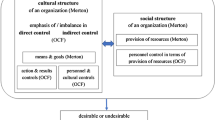Abstract
This paper examines deviant managerial behavior, and compares such behavior to the clinical psychological sociopathic model. The scope of a multinational corporate operation can enhance or degrade the quality of life for individuals with more impact than at any previous time in history. Social costs are compared to the results of sociopathic behavior and examined as the result of amoral or immoral behavior. The idea of the sociopathic manager is discussed, and theoretical causes of sociopathic development are examined with bases in behavioral, economic and criminological literature. Future research and recommendations for prevention of sociopathic behavior are advanced.
Similar content being viewed by others
References
Adorno, T. E. Frenkel-Brunswik, D. Levinson and R. Sanford: 1950, The Authoritarian Personality (Harper and Row, New York).
Ansbacher, H.: 1991, ‘Anomie, the Sociologist's Conception of the lack of Social Interest’, Individual Psychology 47, 22–25.
Beck, A. and A. Freeman: 1990, Cognitive Therapy of Personality Disorders (Guilford Press, New York).
Burton, T.: 1992, ‘Open Market: How Industrial Foam Cam to be Employed in Breast Implants’, The Wall Street Journal, March 25, p. 1, A4.
Bower, J.: 1974, ‘On the Amoral Organization’, in R. Marris (ed.), The Corporate Society (Halsted Press, New York), pp. 178–213.
Braungart, R.: 1978, ‘Multinational Corporations: New Dimensions in Community Power’, Sociology Symposium 24, 117–135.
Carroll, A.: 1987, ‘In Search of the Moral Manager’, Business Horizons 30, 7–15.
Cleckley, H.: 1976, The Mask of Sanity (C. V. Mosby, St. Louis).
Daneke, G.: 1985, ‘Regulation and the Sociopathic Firm’, Academy of Management Review 10, 15–20.
Dugger, W.: 1988, ‘An Institutional Analysis of Corporate Power’, Journal of Economic Issues 22, 79–111.
Galliher, J.: 1973, ‘The Protection of Human Subjects: A Reexamination of the Professional Code of Ethics’, The American Sociologist 8, 93–100.
Gummer, B.: 1985, ‘Committing the Truth: Whistleblowing, Organization Dissent, and the Honorable Bureaucrat’, Administration in Social Work 9, 89–102.
Janis, I.: 1982, Groupthink (Houghton-Mifflin, Boston).
Junker, L.: 1983, ‘The Conflict Between the Scientific Technological Process and Malignant Ceremonialism’, American Journal of Economics and Sociology 42, 341–352.
Kapp, K.: 1978, The Social Costs of Business Enterprise (Spokesman, Nottingham, England).
Kramer, R.: 1989, ‘Criminologists and the Social Movement Against Corporate Crime’, Social Justice 16, 146–164.
MacIver, R.: 1950, The Ramparts We Guard (Macmillian, New York).
McCord, W.: 1982, The Psychopath and Milieu Therapy (Academic Press, New York).
Milgram, S.: 1974, Obedience to Authority (Harper and Row, New York).
Nader, R. and W. Taylor: 1986, The Big Boys (Pantheon Books, New York).
Needleman, M. and C. Needleman: 1979, ‘Organizational Crime: Two Models of Criminogenesis’, The Sociological Quarterly 20, 517–528.
Passas, N.: 1990, ‘Anomie and Corporate Deviance’, Contemporary Crises 14, 157–178.
Pearce, F. and S. Tombs: 1989, ‘Bhopal: Union Carbide and the Hubris of the Capitalist Technology’, Social Justice 16, 116–144.
Schrager, L. and J. Short: 1978, ‘Toward a Sociology of Organizational Crime’, Social Problems 25, 407–419.
Sjoberg, G., T. Vaughan and N. Williams: 1984, ‘Bureaucracy as a Moral Issue’, The Journal of Applied Behavioral Science 20, 441–453.
Smith, R.: 1978, The Psychopath in Society (Academic Press, New York).
Stringer, D., H. Remick, J. Salisbury and A. Ginorio: 1990, ‘The Power and Reasons Behind Sexual Harassment: An Employer's Guide to Solution’, Public Personnel Management 19, 43–52.
Szwajkowski, E.: 1985, ‘Organizational Illegality: Theoretical Integration and Illustrative Application’, Academy of Management Review 10, 558–567.
Turnbull, C.: 1972, The Mountain People (Simon and Schuster, New York).
Ullmann, L. and L. Krasner: 1969, A Psychological Approach to Abnormal Behavior (Prentice Hall, Englewood Cliffs).
Yeager, P.: 1987, ‘Structural Bias in Regulatory Law Enforcement: The Case of the U.S. Environmental Protection Agency’, Social Problems 34, 330–344.
Zimbardo, P.: 1969, ‘The Human Choice: Individuation, Reason, and Order Versus Deindividuation, Impulse and Chaos’, in W. Arnold and D. Levine (eds.), Nebraska Symposium on Motivation (University of Nebraska Press, Lincoln, NE), pp. 237–308.
Author information
Authors and Affiliations
Additional information
N. S. Miceli is a doctoral student at the University of Oklahoma majoring in Management (Organizational Behavior and Human Resource Management). His research interests include the effects of ASPD on decision making, attitudes toward disabled persons, occupational health and stress, international business, cross-cultural issues and labor relations.
An earlier version of this paper was presented at a Southwest Academy of Management Meeting.
Rights and permissions
About this article
Cite this article
Miceli, N.S. Deviant managerial behavior: Costs, outcomes and prevention. J Bus Ethics 15, 703–709 (1996). https://doi.org/10.1007/BF00411805
Issue Date:
DOI: https://doi.org/10.1007/BF00411805




